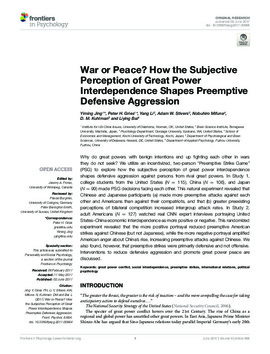| dc.contributor.author | Jing, Yiming | |
| dc.contributor.author | Li, Yang | |
| dc.contributor.author | Gries, Peter H. | |
| dc.contributor.author | Stivers, Adam W. | |
| dc.contributor.author | Mifune, Nobuhiro | |
| dc.contributor.author | Kuhlman, D.M. | |
| dc.contributor.author | Bai, Liying | |
| dc.date.accessioned | 2019-04-02T16:07:04Z | |
| dc.date.available | 2019-04-02T16:07:04Z | |
| dc.date.issued | 2017-06-02 | |
| dc.identifier.citation | Jing Y, Gries PH, Li Y, Stivers AW, Mifune N, Kuhlman DM and Bai L (2017) War or Peace? How the Subjective Perception of Great Power Interdependence Shapes Preemptive Defensive Aggression. Front. Psychol. 8:864. doi: 10.3389/fpsyg.2017.00864 | en_US |
| dc.identifier.uri | https://hdl.handle.net/11244/317829 | |
| dc.description.abstract | Why do great powers with benign intentions end up fighting each other in wars they do not seek? We utilize an incentivized, two-person “Preemptive Strike Game” (PSG) to explore how the subjective perception of great power interdependence shapes defensive aggression against persons from rival great powers. In Study 1, college students from the United States (N = 115), China (N = 106), and Japan (N = 99) made PSG decisions facing each other. This natural experiment revealed that Chinese and Japanese participants (a) made more preemptive attacks against each other and Americans than against their compatriots, and that (b) greater preexisting perceptions of bilateral competition increased intergroup attack rates. In Study 2, adult Americans (N = 127) watched real CNN expert interviews portraying United States–China economic interdependence as more positive or negative. This randomized experiment revealed that the more positive portrayal reduced preemptive American strikes against Chinese (but not Japanese), while the more negative portrayal amplified American anger about China’s rise, increasing preemptive attacks against Chinese. We also found, however, that preemptive strikes were primarily defensive and not offensive. Interventions to reduce defensive aggression and promote great power peace are discussed. | en_US |
| dc.description.sponsorship | Open access fees fees for this article provided whole or in part by OU Libraries Open Access Fund. | en_US |
| dc.language | en_US | en_US |
| dc.rights | Attribution 4.0 International | * |
| dc.rights.uri | https://creativecommons.org/licenses/by/4.0/ | * |
| dc.subject | great power conflict | en_US |
| dc.subject | social interdependence | en_US |
| dc.subject | preemptive strikes | en_US |
| dc.subject | international relations | en_US |
| dc.subject | political psychology | en_US |
| dc.title | War or Peace? How the Subjective Perception of Great Power Interdependence Shapes Preemptive Defensive Aggression | en_US |
| dc.type | Article | en_US |
| dc.description.peerreview | Yes | en_US |
| dc.identifier.doi | 10.3389/fpsyg.2017.00864 | en_US |
| ou.group | David L. Boren College of International Studies | en_US |

